IN-DEPTH |
Final part of a series on domestic violence in Springfield and Greene County.
- Related story: What you can do to help
- Need help? See related story.
Kai Sutton was fleeing an abusive relationship for the second time in her life when she came to the Ozarks from Chicago in 2011.
She left behind a successful career and almost everything she owned, save for a few items crammed into a black suitcase.
Since her abuser controlled the finances, her mom purchased five $1 Megabus tickets for Sutton and her four children.
A friend gave her $20 to buy food along the way.
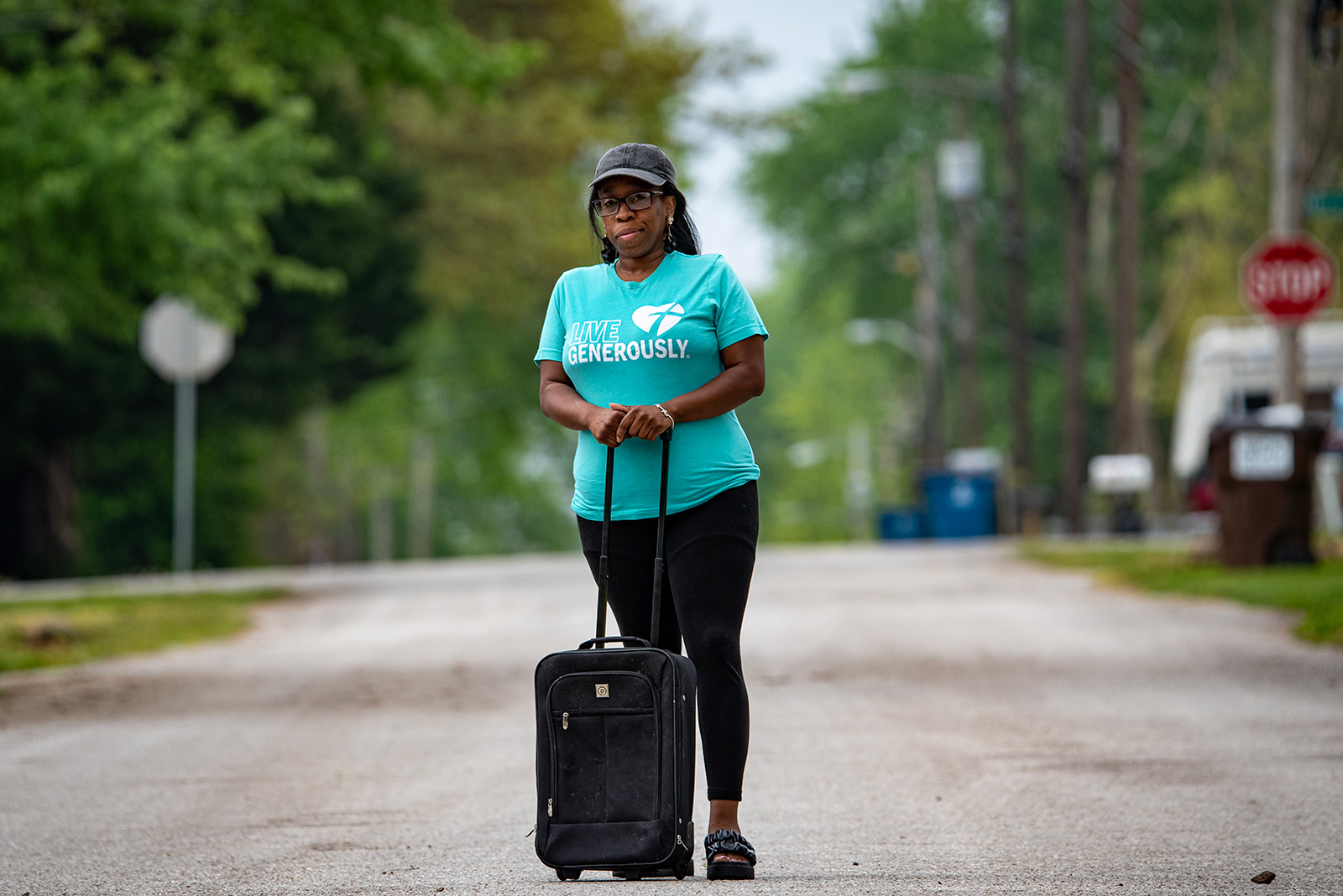

- Part I: Black eye for Greene Co.
- Part II: Obstacles to leaving
- Part III: Systemic issues
- Part IV: Searching for solutions
“We had a big house, two cars,” she said. “I had my own (real estate) business, you know, I had employees. I was successful, but I left it all.”
For a time, she and her kids had to live with Sutton’s little sister in Joplin. Sutton and her four children slept on a twin size bed.
“I had to humble myself,” she said.
The man she was leaving was also the father of two of her children. They had been together for 11 years. The first 10 years were like a “Hollywood romance,” Sutton said.
“But it got really bad, and I left.”
Sutton suffered from depression when she first arrived in Missouri.
“I didn’t know anybody. I was wearing all black. I was in the house just eating,” she said, “very depressed, dark. I shaved all my hair. And then I just got into activism by mistake.”
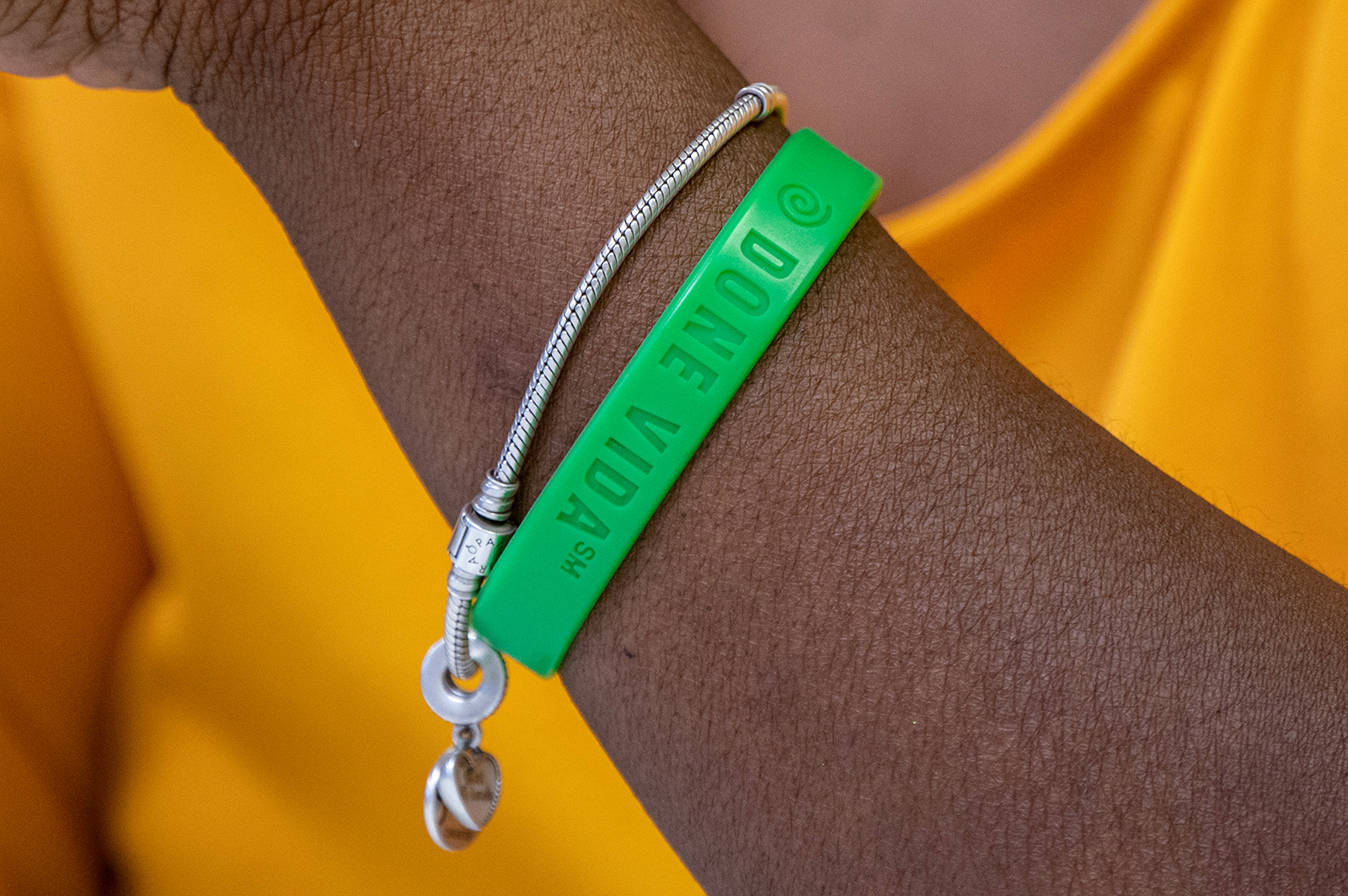
That “activism” now includes her role as a fierce advocate for victims of domestic violence, as well as equality and diversity.
Sutton serves as president of Springfield’s NAACP Chapter and is a board member for Harmony House, Greene County’s only shelter for victims of domestic violence and their children.
Every year, she organizes a walk to honor victims and survivors of domestic violence and to raise awareness, as well as a conference for girls and young ladies aimed at empowering and boosting self-confidence.
Young love turned into abuse
Sutton, now 41, said she was mostly raised by her great-grandmother while her mom went to work and school. She stayed at her mom’s on the weekends.
“When I would visit my mom on the weekends, there was severe abuse going on between her and her husband,” Sutton said. “That was very hard to see.”
Joy Sandy, Sutton’s mother, recalled how her children — including Sutton, the oldest of five — witnessed her being abused.
“My kids physically watched me get beat up and thrown through a glass table by their father,” Joy Sandy said. “That (incident) was the end of that, because they started picking up weapons, like, ‘You aren’t going to hurt my mom. You can’t continue to do this to my mom.’”
Sandy said her kids’ father threw her down a flight of stairs when she was five months pregnant with her son, causing her to go into labor.
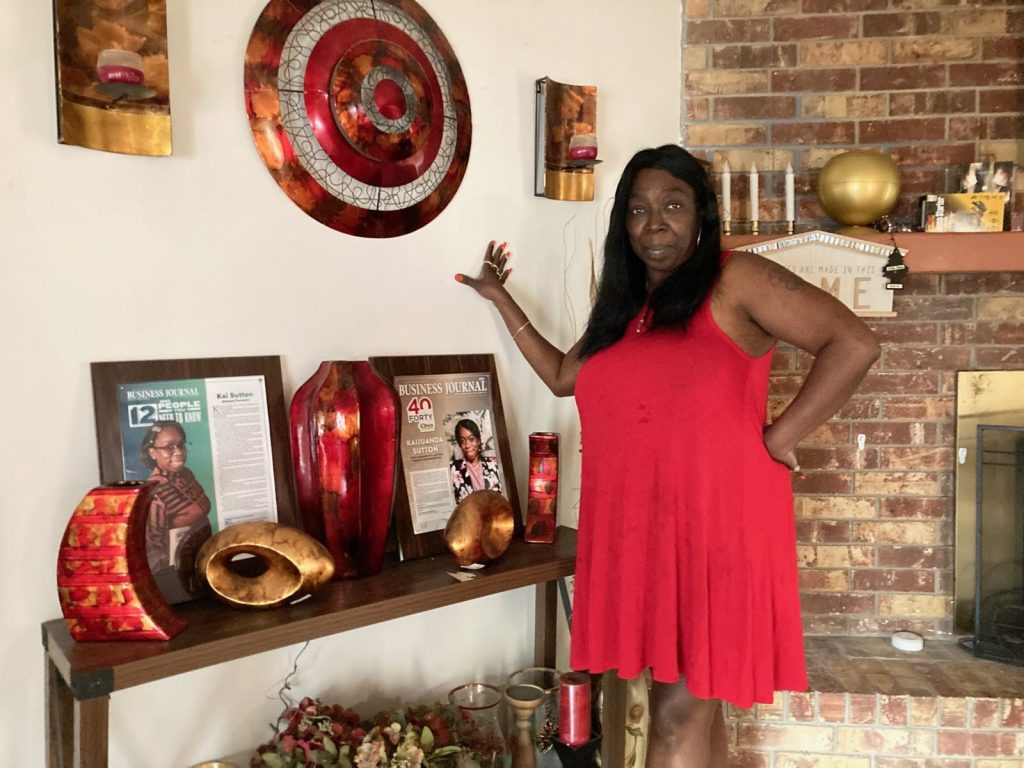
“It was just a joke to him,” Sandy said. “I went through a lot.”
Looking back, Sandy said, she often feels like she failed her children by staying in an abusive relationship with their father.
“They witnessed abuse. They witnessed him beating me. At the time I thought, ‘Oh this is how you are supposed to live. You are supposed to get beat,’” Sandy said. “I consoled Kai when she went through a lot of the things she went through. I’d tell her, ‘You don’t have to accept that. You deserve better than that. You are better.’
“I can give that speech all day long, but I never could give it to myself.”
Sandy left the abusive relationship more than 20 years ago.
Cycle of abuse continued
Sutton knew of several other relatives who were in abusive relationships. Some of those relatives were men who were the abusers. That, too, was “hard to see.”
And like many who are surrounded by domestic violence as a child, Sutton found herself in an abusive relationship first in her teens, then again later as an adult.
“I was 13. He was 16,” she recalled of that first relationship. “I got pregnant at 15, had the baby at 16. And he was extremely abusive, physically, verbally, emotionally, financially, mentally.”
Looking back, like many victims, she’s not sure if she recognized she was being abused at the time. After all, she was young and had grown up with domestic violence rampant — and yet accepted — in her family.
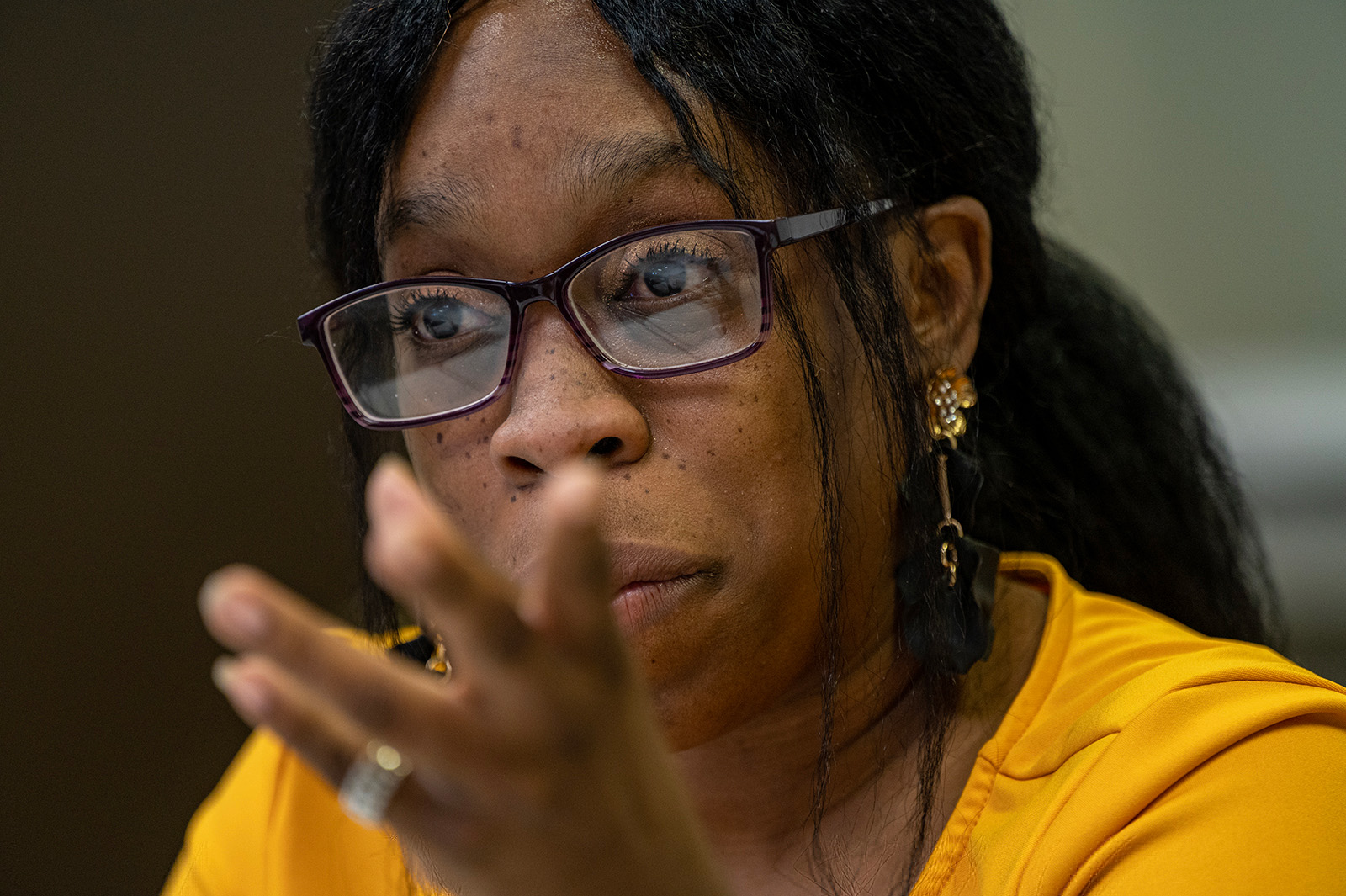
“I was so used to seeing it and people staying in it. So I thought, you know, it was normal because that’s all I knew,” she said. “I thought, ‘We’ll go through this. We’ll make up. He’s really not a bad guy. This is not all the time. This is my daughter’s father.’
“And he would tell me, ‘Nobody’s gonna love you like I do,’” Sutton said. “And I believed it because he took care of us.”
Because she got pregnant, Sutton attended an alternative school. But she managed to graduate a year early despite having a baby and being under immense pressure from her abuser.
“He would come to my school bus stop and follow me, threaten me, make sure I got to school,” she said. “I had to call him when I got to school so he knows I’m at school. I had to call when I was leaving school so he knows I’m on the way home.”
Her abuser was in and out of jail, but found ways to continue the emotional abuse even while incarcerated.
“He wrote me this letter at one point that said ‘you’re the most ugliest girl I’ve ever met and your lips are extremely huge. And nobody’s gonna want you,’” Sutton said softly. “He broke me. Yeah, he broke me.”
When she was eight months pregnant, he pushed her out of a moving vehicle.
“I was able to catch the ground with my hands but my belly hit the ground first. But the baby was OK,” she said. “It was a lot of abuse. It was a lot as a young girl.”
The one time she fought back, she was beaten so bad she went to hospital
Sutton’s first boyfriend would often threaten suicide to control her. He also threatened to kill her.
“He would pick up a glass and he would bang it across his forehead and so blood would start coming,” she said. “He said, ‘If you leave me, I’m gonna kill myself.’ He’d say, ‘If I can’t have you, nobody will have you.’
“So as a 15-, 16-year-old girl, I was in fear for my life,” she said. “He did that several times. He would have to go to the hospital and get stitches.”
He would often rip the phone out of her hands to make sure she wasn’t talking to another man.
One time, when he tried to snatch the phone away, their baby daughter was lying in bed nearby. The assault that followed was brutal and terrifying.
“He balled his fist to try to hit my face, but he missed and he hit my daughter in the face,” she said. “That was the only time I think I tried to fight back.
“And he beat me up so bad to where my lip was split, falling, like detached,” she said, trying to describe the injury.
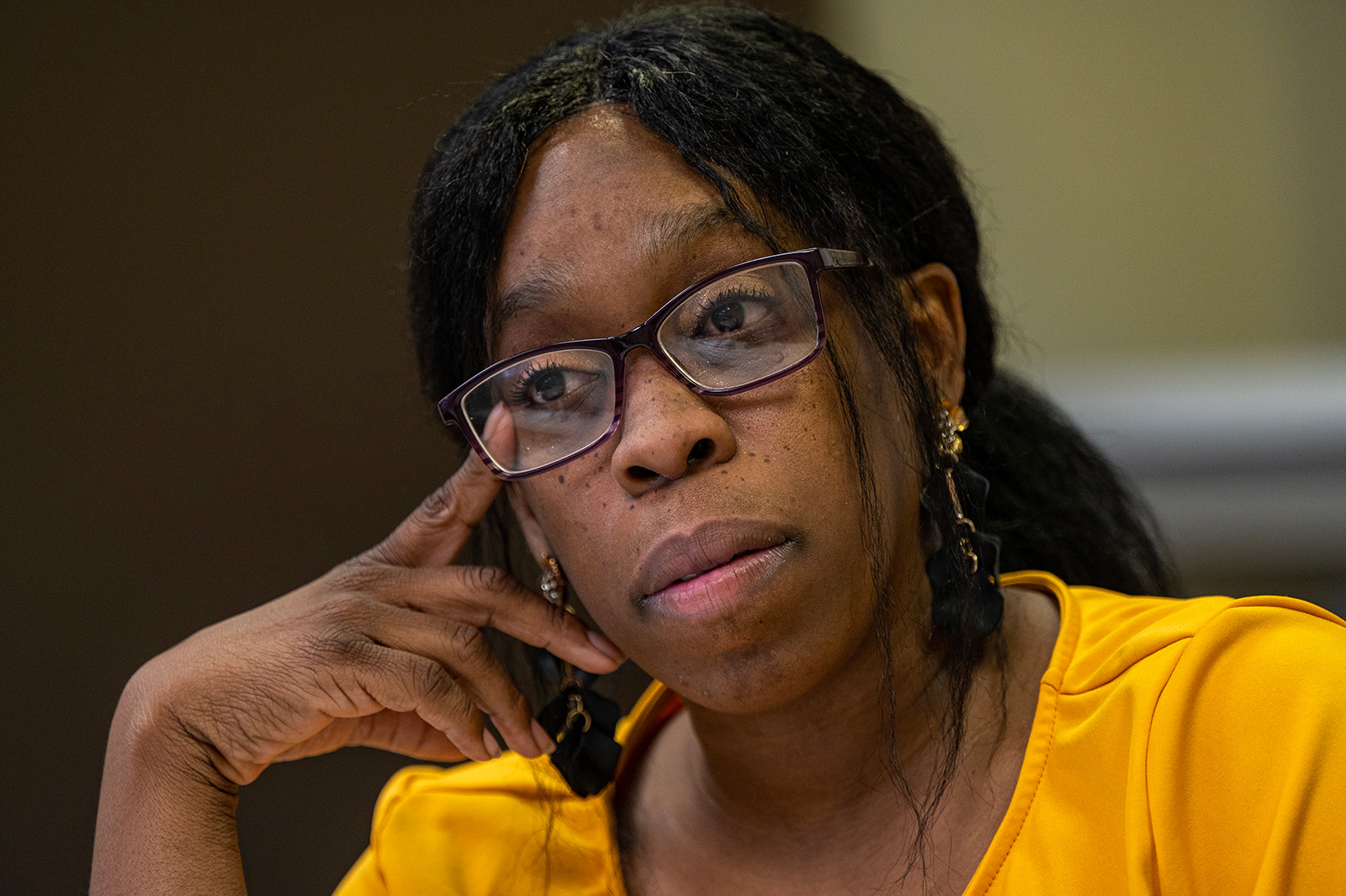
She drove his car to the emergency room. She is not sure if he called a cab or ran — but he made it to the hospital before they could stitch her lip back together.
The police were there and ready to take a report when she saw him staring at her. She recalled how big he looked, like a “linebacker, football player type build.”
“He was breathing real hard with his fist balled,” she said. “I instantly got scared and I knew at that moment, I better get up and go home with him because it’ll be trouble for me later.”
That was the closest she came to ever reporting the abuse to law enforcement.
As she got a little older, Sutton gained the confidence to leave this man. But it wasn’t easy.
“He didn’t give up. He fought. He kidnapped my daughter at one point,” she said. “He threatened me. It was very bad.”
Sutton: Support victims rather than judge them
When Sutton was being abused as a teen, she confided in two friends about what was happening.
One friend was supportive; the other was not.
“She would call me ‘stupid,’” Sutton said. She would say things like, ‘How could you be that girl?’”
The most horrible thing you could say to someone who is in a domestic violence situation is ‘Why are you staying?’ or ‘You are stupid for staying.’
KAI sutton
Unfortunately, comments like that are common, Sutton said. And it’s just another reason why victims are reluctant to reach out for help.
“People are so quick to judge. That is why I say be less judgmental. They say, ‘Oh, why is she staying? If it was me, I’d be gone,’” she said. “But you don’t know the mental state of which the victim is in at that moment.
“The most horrible thing you could say to someone who is in a domestic violence situation is ‘Why are you staying?’ or ‘You are stupid for staying.’”
What you can do to help
Click here to learn how to support someone you suspect is being abused — or to find a list of ways you can volunteer or donate to support services for domestic violence victims in Greene County.
Death of loved one leads to advocacy
Landing in the Ozarks more than a decade ago, Sutton said she began to open up about her experience with domestic violence when talking with women in places like the doctor’s office.
It seemed everywhere she turned, Sutton found she was speaking with another victim or survivor of domestic violence.
“This is so big,” she recalled thinking. “Oh my God, it’s everywhere.”
Sutton said she once had a next-door neighbor who was a victim of domestic violence and would often seek refuge in the middle of the night at Sutton’s place. The neighbor’s children, too, would sometimes run to Sutton’s home for safety.
This happened so frequently that Sutton would leave the door unlocked, and put cookies and milk out for her neighbor’s kids.
Then something happened that propelled Sutton into advocacy for victims. It was Christmas 2012 and she had taken her kids to see their father in Chicago.
Her best friend (who is originally from Chicago but was in Florida at the time) called and asked Sutton if she’d stop by to check on the friend’s mom — a woman Sutton always called Miss Vicki. The friend told Sutton that some family members were supposed to have Christmas dinner at Miss Vicki’s, but when they knocked on the door no one answered.
Sutton agreed to check on Miss Vicki, but no one answered the door. Sutton called the police.
“They had to kick in the door. And on the other side of the door lies her body, Miss Vicki,” Sutton said. “She was like an auntie to me. She was murdered by her abuser. She was living in silence. She was married for like 30 years and her husband was abusive the entire time.”
Sutton called Miss Vicki’s death a “strange” lesson for her: Sutton knew all about physical and emotional abuse because she’d seen it growing up and experienced it as a teen and adult.
“But I never thought that death could be a result of domestic violence,” she said. “And finding her, looking at her lifeless body and having to clean it up — because we had to clean (it up) — it changed me forever.”
To honor Miss Vicki, along with other victims and survivors of domestic violence, Sutton organized the annual Stand Up Speak Out Domestic Violence Awareness Walk.
The walk started in 2015 and happens in Springfield and Chicago every October, which is National Domestic Violence Awareness Month.
About 200 people attend the walk in Springfield every year.
“I’m all about awareness,” she said. “I’m always making myself available to people who need to get out. If I have to go by myself and put them on my shoulder and carry them out of the house, I have done it.”
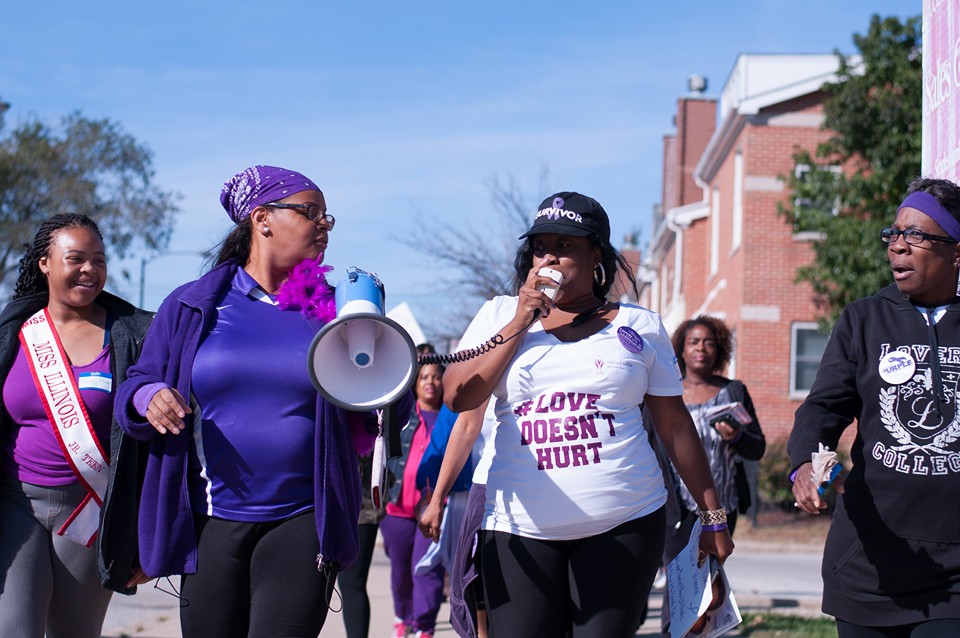
She’s personally put victims up in motels if no shelter beds were available. She helps with safety planning and exit strategies.
Her mother is proud.
“She is trying to make a stand,” Sandy said of her daughter, “to let all of us know — all the women, not only in the family — to see this bigger picture that you can better yourself. You can stand up for yourself.
“I’m ecstatic that she found the strength within herself to stand up and say, ‘I’m not accepting this anymore. It’s not acceptable,’” Sandy said. “Her struggle has been long and hard, but she faces her struggle.I didn’t have the strength.”
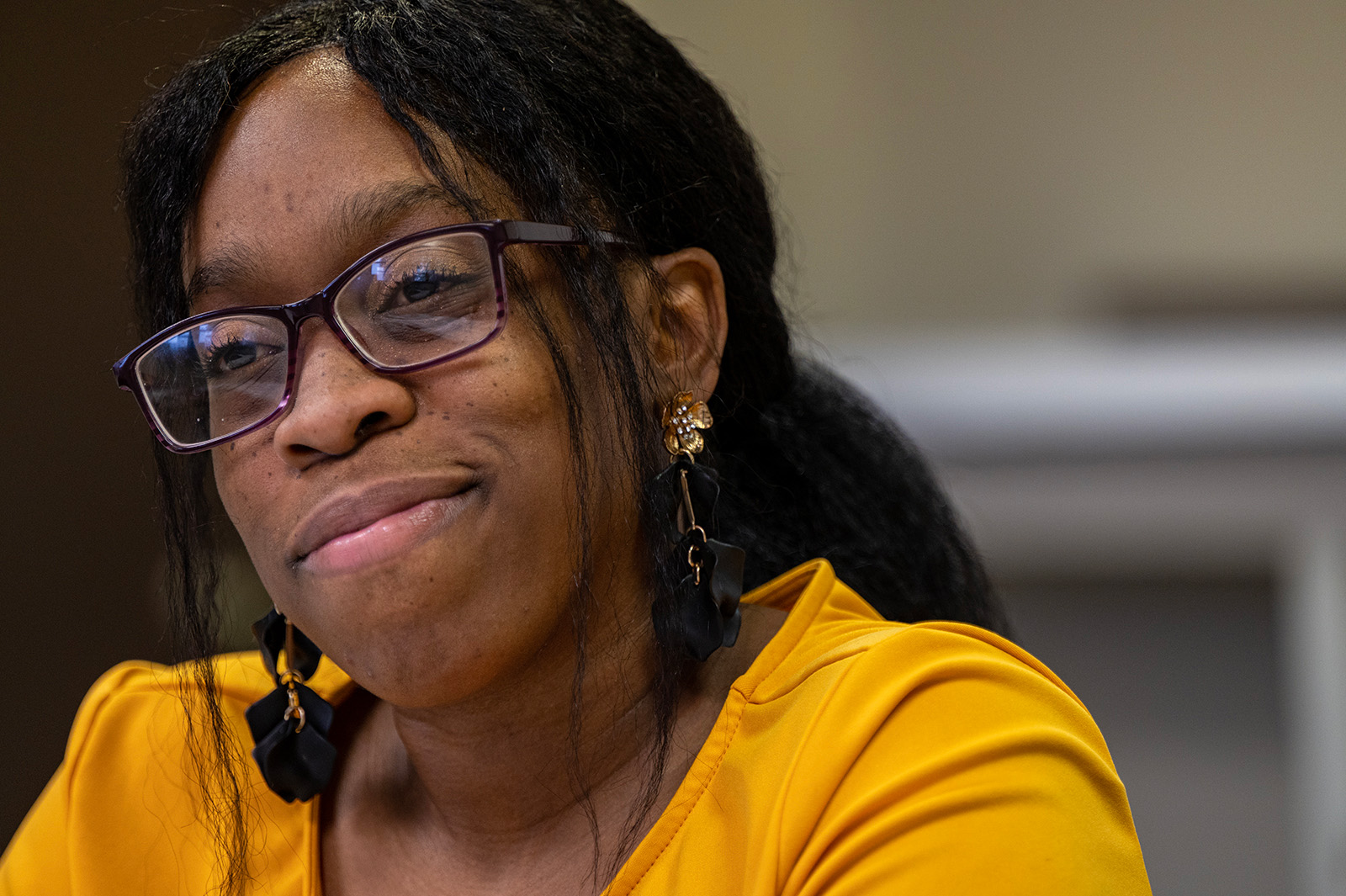
Advocate, survivor teaching young girls to love themselves
Sutton also created the Amazingly Me Self Esteem Conference, an annual event for girls ages 8 to 18 aimed at helping them gain a healthy self-esteem, leadership skills, and learn how to make positive decisions.
Teaching young girls to love themselves enough to not put up with a partner’s controlling and abusive behaviors is important, Sutton said.
“We have to love ourselves so much that we are the most important person in our life,” she said, “because if we are not caring for us the most and putting ourselves first, we’re not going to properly care and love anybody else.”
This year’s conference, which will happen sometime this fall, will be the 10th conference held in Springfield. When it started a decade ago, about 20 girls attended. Now it’s up to more than 200 attendees.
“It just goes up every year,” she said. “That’s a really big deal for me because it’s also healing, you know?
“I get to heal that inner girl,” she continued, “and get to be somebody that I needed who I didn’t have growing up.”
Learn more about annual events
For more information about the Stand Up Speak Out Walk in October or the Amazingly Me Conference, which will be scheduled later this year, email Sutton at kaisutton21@gmail.com.
About Living in Fear
This special investigative report explores the far-reaching and insidious nature of domestic abuse in our community. Living in Fear is being presented in four parts over two months:
- Part I: Black eye for Greene County, which was published May 8-11, looks at the depth and breadth of the problem here.
- Part II: Obstacles to leaving, published May 22-25, examines the dynamics and complications facing victims looking to leave abusive relationships.
- Part III: Systemic issues, published June 12-14, puts a focus on the criminal justice system and potential shortcomings.
- Part IV: Searching for solutions, published this week, taps local, regional and national experts in search of ways to improve the system and reduce domestic violence.

